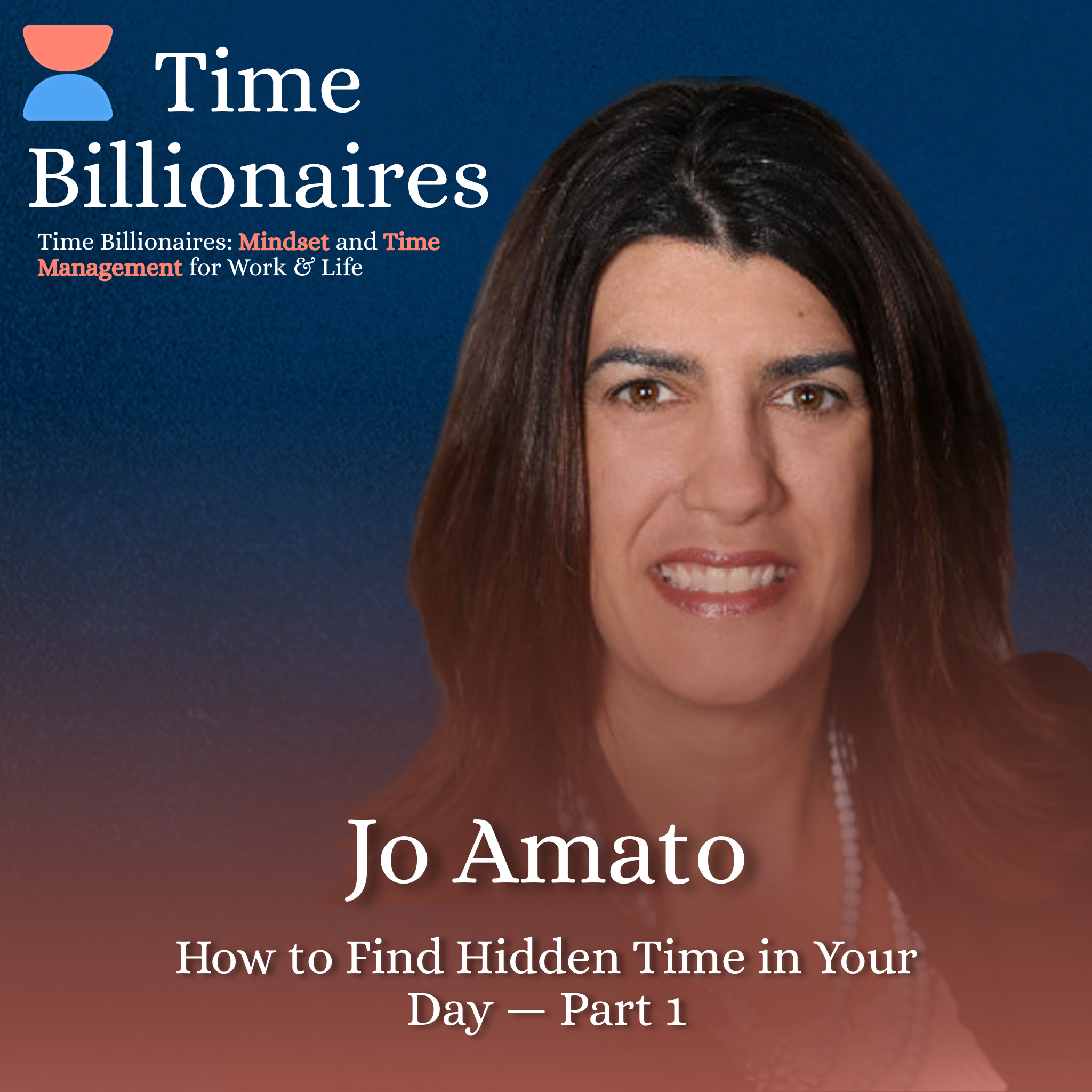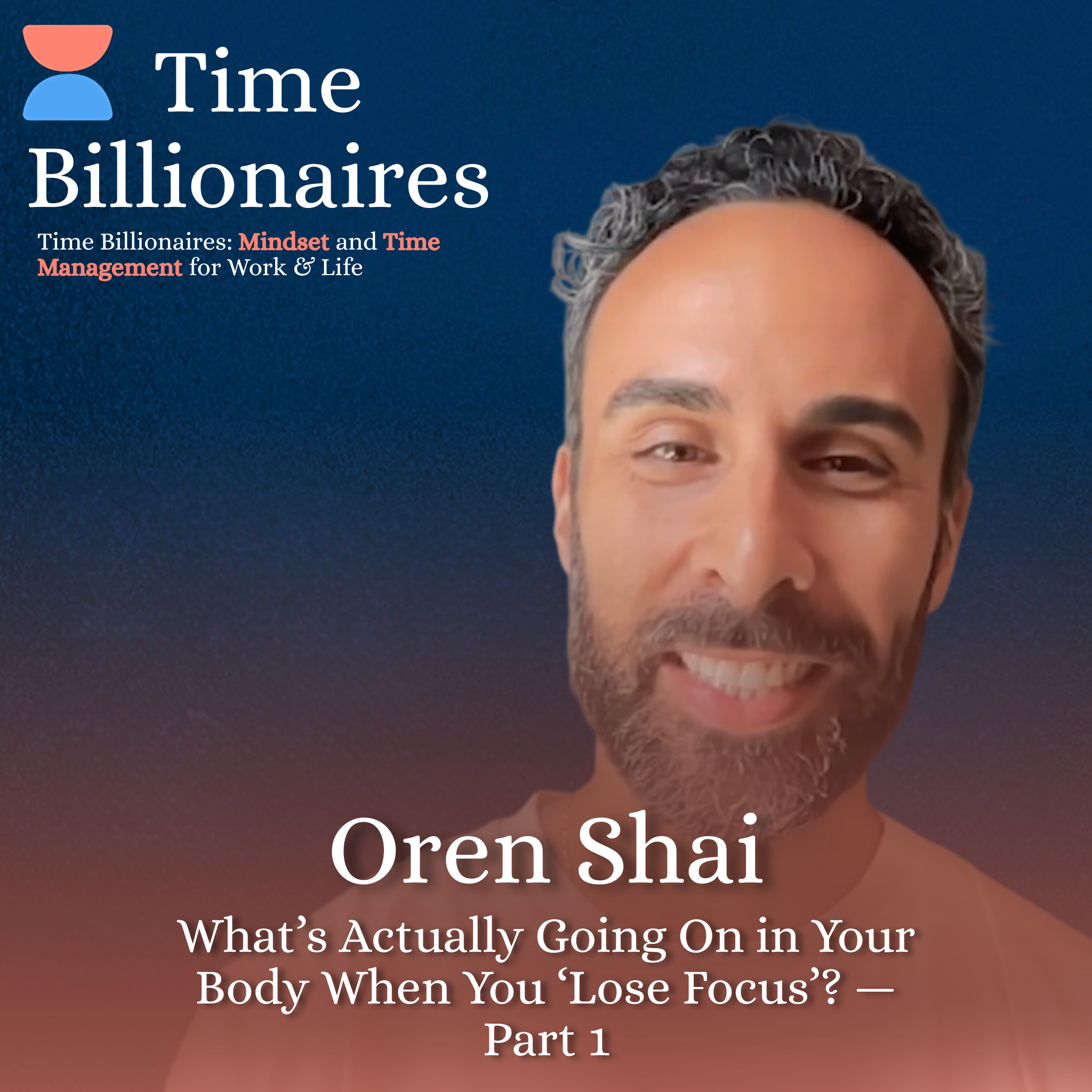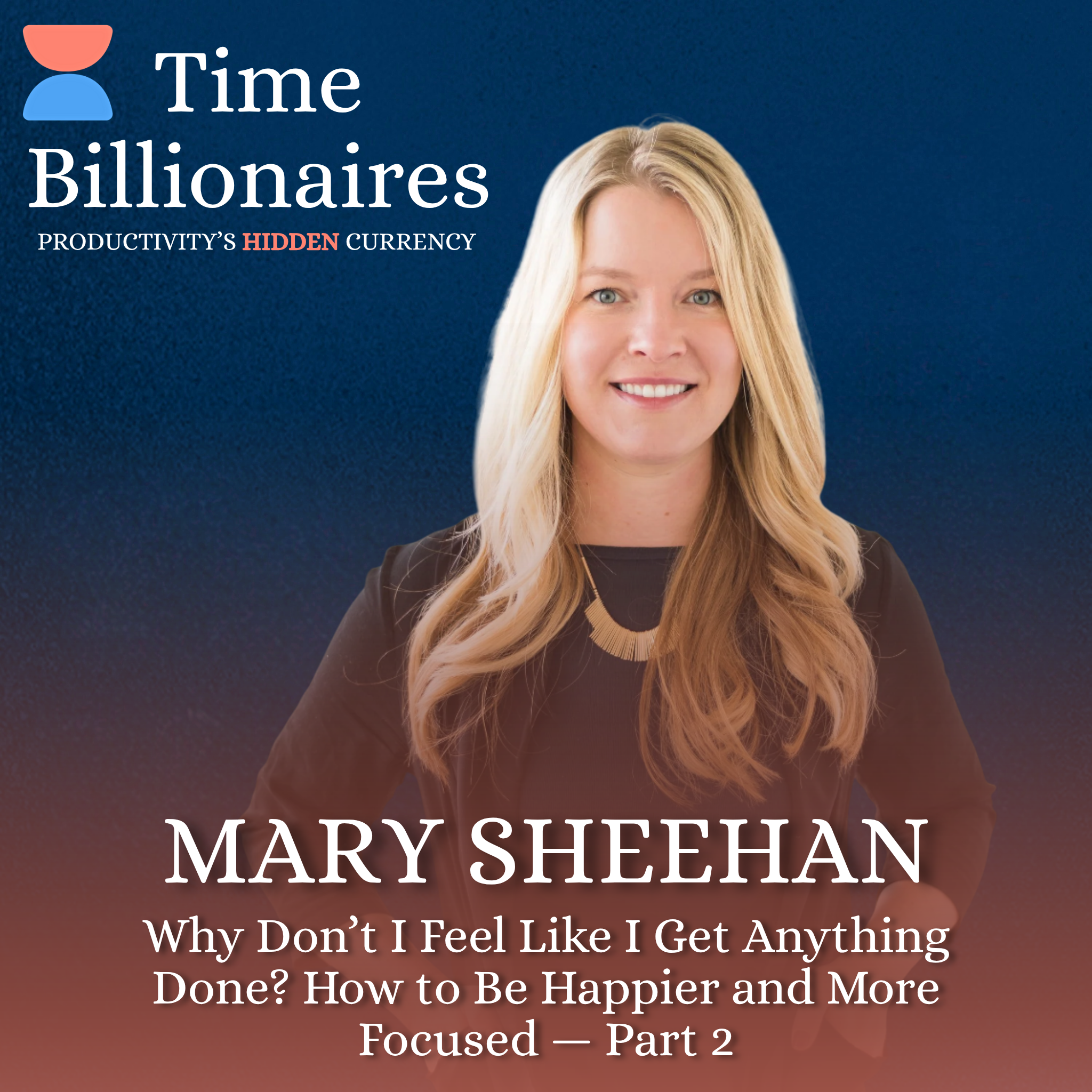Episode Transcript
[00:00:00] Speaker A: The more experience I have in life, the more I realize how time is our most precious asset. And that sounds so cliche, but also very true. And I think as I progressed, I've realized how it's actually not what you say yes to that's important, it's how mindful you are about all of the things that you say no to.
[00:00:22] Speaker B: Hey there billionaire. Yep, I'm talking to you. If you expect to live another 31 years, you're already a billionaire. Not in money, but in the real measure of wealth, time. That's because 31 years is roughly a billion seconds. But most of us waste time in ways we'd never waste money. The currency of time billionaires is micro moments. The 90 second to 15 minute gaps hidden between the structured parts of your day. This podcast is about reclaiming them with quick, research backed ideas to help you feel more creative, productive and alive. Welcome to Time Billionaires. Let's make your next micro moment count.
[00:01:06] Speaker C: I have been so excited for this episode of the Time Billionaires podcast where we're joined by a very old friend of mine I've actually known since high school, the incredible Marissa Morrison, who's worked at places like PricewaterhouseCoopers, LinkedIn and top VC backed startups, and is now the Vice President of people at ZipRecruiter. She believes that what makes us unique is our superpower. And drawing on her diverse background, Marissa provides helpful, relatable, actual insights on people in hr. She guides business leaders and high performing leaders looking to navigate their careers and build thriving workplaces. Thanks for being here Marissa.
[00:01:42] Speaker A: Thank you. It's so great to be here and shout out to high school friends turned partners, colleagues, confidants, mentors. Like all of the things. So all of the things special to be here and so grateful to be here.
[00:01:58] Speaker C: It really is. Yeah. And so special for so many life phases. Which is why I'm so excited to talk to you about something I've had a front row seat to throughout lots of really exciting chapters in your career, which is this intersection you work at of leadership, people, strategy, personal development, and I'd love for you to share how your perspective on time has evolved over your career.
[00:02:19] Speaker A: Yes, such a meaty, good question.
I would say to summarize, the more experience I have in life, the more I realize how time is our most precious asset. And that sounds so cliche, but also very true. And I think as I progressed I've realized how it's actually not what you say yes to that's important, it's how mindful you are about all of the things that you say no to.
And I think my learning and curiosity, both mindfulness and awareness and time allocation, came from many years of burning out and this obsession with saying yes to everything. I've always had this sense of wanting to take on as much as I can, make the most of this one beautiful life that I have.
And sometimes that's at the expense of my own sanity. So through many years of sort of learning through failure, whether that looked like burnout or a packed schedule that disallowed me from being present anywhere, I've more recently started to slow down and be really mindful and protect my yeses much more. And that's why I'm excited to talk with you. And I think the work you're doing is so important because we move so fast in today's culture. And while I think there's some lowering of volume on praising hustle culture, there's still still so much doing, and not all doing is productive. And I think there's value in reminding people that doing more is not always more. And sometimes you say no to something, but then take on five other things. So assessing how you're spending your time is most important work we can do.
[00:04:03] Speaker C: It's so true. And there's so much there. There's two things that I want to follow up on that I think are especially relatable. I think you're right that the doing culture is still very preeminent. The busyness as a badge of honor is sort of this badge of honor. Right. So when we think of good uses of time, how do you think about the protecting your time in a way that doesn't then give you this sort of mental, okay, I said no, so now I have the time freed up to say yes to something else. How do you think about being really intentional with that?
[00:04:33] Speaker A: Yeah, I.
I think you have to put the systems in place. I say that all the time.
Our days, our weeks, our years will either happen to us or happen for us. And if we want them to happen in the way that we intend, we have to be intentional. So I've always been a fan of planning both on large scale, medium scale, and then very small scale. So I'll start with a small scale. I am a believer in an old school planner. I am a believer in either ending my day with what are the three things I want to get done tomorrow, personally and professionally? Or starting my day with what are the three things I want to get done today, personally or professionally being okay, that sometimes that list is One thing personally and one thing professionally I want to get done. I would say three is that upper limit.
But really being intentional about on a daily basis, where do you want to go? And then have somewhat more flexibility of like this month, what are the main priorities that I have?
Sometimes it's working out, sometimes it's sleeping. But being clear about those priorities will then allow you to choose, okay, do I schedule that workout class and I wake up at 6am or do I actually sleep this month? And like what is my priority? And same goes with longer term planning. Obviously it's more gray and squishy the further out you go. But having a general compass of got some single girlfriends out there that are like, I want to have babies one day, I want to get married and they're dating the wrong person. As simple as that. Of like, well, if in your squishy zero to five year plan you want to have babies and get married, you should probably focus on dating the right person. And that's just a very real example that I think being very clear about where you want to go, you can then make the choices. We're like, actually I'm not going to continue dating somebody that I would never marry because in so far in my future I have other things that I prioritize.
[00:06:29] Speaker C: It's so true. I love the way you frame that and I think that's a very relatable example because there's something you want a lot.
[00:06:36] Speaker A: Yeah.
[00:06:36] Speaker C: Which is this big long term goal, but there's something in front of you that you clearly get something out of and you like. So giving up something, it's comfortable. This person's here. They clearly have some redeeming traits if you're with them. But giving up that good for this overall bigger, great, aligned with your goals is so important. And that brings me back to the very first question I had when you were describing these priorities. Giving things up, people pleasing is something that I come across a lot of people saying, yes, I know my priorities, but I want to be a good teammate, I want to be a good partner and they need things from me. How do you think about dealing with your priorities, your needs and protecting that time while also thinking about your bigger role in this broader ecosystem, workplace, family structure.
[00:07:20] Speaker A: Absolutely. I'm going to break that up. There's personal and then there's professional and I'm going to break that up because for many people professionally you have less agency. Personally, hopefully you feel and take the responsibility that you have full agency for the most part.
So professionally I would encourage anybody who feels like they don't have enough time to get really clear on priorities. And again, I would use the same framework. I would talk to your manager about what a success in my role look like. And if that feels squishy, be very clear in the next 12 months. What are the big things I should be focusing on thinking about in the next six months? What does it look like for me to meet or exceed the expectations of my role? And on a weekly level, ask your leader, are these the right priorities? I have a wise mentor that gave me the advice that every week you should send your manager an email of what milestones you hit, where you need their help, and what you're focused on next week. Brilliant. Very clear strategy to make sure that you are both thinking about what you're working on and, and there's that loop of clarity that you are working on the right things with whoever has a little more control over what you should be doing. So I think that is a really great framework. And again, it's why when I say, like, I plan my day, what are the three things tops I have to get done professionally? And then what are the three things tops that I have to get done personally so that it feels very tangible and clear about what you're doing that day, very tactically on the personal sense, for you do have more agency.
I take an inventory of my life pretty frequently. This is perhaps wild to admit, but it's true. And I think it could be helpful because I also tend to be someone that wants to make everybody happy. And I am both like, very extroverted and like, I also absolutely gain energy by being alone and have talked to people about my ten day silent meditations. That feels like the most decadent thing because I can totally be in my own thoughts for 10 days and it is just like decadent for me.
So balancing those can be really hard because it's like, I'll be alone for a while and I'm like, oh, this is so nice. I'm just literally thinking, and then I'll be with people for three events straight. And I'm like, that was really energizing. I have a list of hell yes situational and pause people that I have broken up into.
Like, how I approach those commitments. So to make that a little bit more clear, my hell yes. Those are the people that it's my family, it's my best girlfriends, it's people that I always feel energized after hanging out with. If that person wants to call and catch up, if that person wants to grab Coffee. If that person wants to go on a walk, that's my hell yes. I always gain energy from those people. I don't even think about it. It's like, yes, when can we get it on the calendar?
And I have a second tier where I'm like situational. There are people who are like, usually I feel good, but maybe I see them every six months, months. And like sometimes maybe I feel like I'm getting more than I'm getting. Or we both just know the nature of the relationship is such that we see each other infrequently. That's like a situational. If I have leftover space and energy, that's like a. Oh, actually in this season I totally have time for coffee. Like, yeah, let's schedule it. Work's not too busy. Family life feels like things are grooving. Yes. Juxtaposed with I just finished my first maternity leave with a baby. Lots of situationals ended up in the no category. Cuz I was just like slowness suited me and protecting my yeses suited me in that season. So unless you were in like the hell yes bucket, I probably was way less social than normal. And then there's like pause for a no. And I. Those are like this types of situations.
And sometimes the people situations are included in this, but sometimes the people that are like pause. If you realize that going to a conference or a networking dinner always leaves you feeling depleted, pause before saying yes. And maybe you really have to be in a season where you are just extroverted and ready to go out and feel super fired up to actually make that situational pause of a networking dinner be a yes for you. But just having that filter has helped me in a lot of ways have permission to not lean in towards the people pleasing. And again, this is the system that sounds probably crazy for some people that I went through the time to do that. But what it does, it's a matrix and it's a framework so that when these invitations come and my natural reaction is to say yes to everything, it's a filter that I can look at to say okay, am I sure? Because I have some data points of how these types of interactions commitments usually make me feel. And some are automated into yes and I can sort of take inventory from there. And I will say it's probably been a year since I did that for the first time, maybe two years. And it has made my decision making a lot clearer and I'm getting a lot more enjoyment out of my yeses.
[00:12:25] Speaker C: I love it. And what I'm hearing too. That was an investment. So it sounds like time upfront, but it saved you all of this time and all these decisions that would have been one off that you relitigated every time. Suddenly you've streamlined from this upfront investment of work, collecting the dividends of saving time, saving energy, enjoying your yeses so much more because you were willing to put in a little bit up front to get more.
[00:12:55] Speaker B: Thanks for spending this micro moment with me. If you found it valuable, share it with a fellow time billionaire and give us a rating to help others discover the power of micro moments. For more ways to reclaim your time, check out timebillionaires.org and follow me. Rebecca Shadix on LinkedIn. See you next time.


